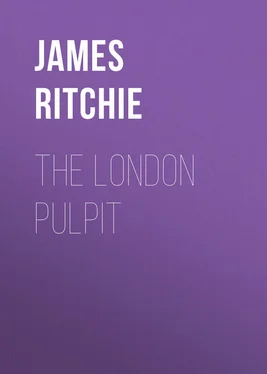James Ritchie - The London Pulpit
Здесь есть возможность читать онлайн «James Ritchie - The London Pulpit» — ознакомительный отрывок электронной книги совершенно бесплатно, а после прочтения отрывка купить полную версию. В некоторых случаях можно слушать аудио, скачать через торрент в формате fb2 и присутствует краткое содержание. Жанр: foreign_prose, на английском языке. Описание произведения, (предисловие) а так же отзывы посетителей доступны на портале библиотеки ЛибКат.
- Название:The London Pulpit
- Автор:
- Жанр:
- Год:неизвестен
- ISBN:нет данных
- Рейтинг книги:3 / 5. Голосов: 1
-
Избранное:Добавить в избранное
- Отзывы:
-
Ваша оценка:
- 60
- 1
- 2
- 3
- 4
- 5
The London Pulpit: краткое содержание, описание и аннотация
Предлагаем к чтению аннотацию, описание, краткое содержание или предисловие (зависит от того, что написал сам автор книги «The London Pulpit»). Если вы не нашли необходимую информацию о книге — напишите в комментариях, мы постараемся отыскать её.
The London Pulpit — читать онлайн ознакомительный отрывок
Ниже представлен текст книги, разбитый по страницам. Система сохранения места последней прочитанной страницы, позволяет с удобством читать онлайн бесплатно книгу «The London Pulpit», без необходимости каждый раз заново искать на чём Вы остановились. Поставьте закладку, и сможете в любой момент перейти на страницу, на которой закончили чтение.
Интервал:
Закладка:
Mr. Dale reads, and reads rapidly; his enunciation is perfectly distinct; his voice is somewhat monotonous, but musical; his action is very slight. You are not carried away by his physical appearance, nor, as you listen, does the preacher bear you irresistibly aloft. His sermons are highly polished, but they are too invariably the same. There are no depths nor heights in them. They are all calm, subdued, toned down. They do not take you by storm: you miss the thunder and the lightning of such men as Melville and Binney. Mr. Dale’s sermons are, like himself and like his poetry, polished and pleasing. All that man can do by careful study Mr. Dale has done; but he lacks inspiration, the vis vivida , the vision and the faculty divine, which, if a man have not, ‘This brave overhanging firmament – this majestical roof fretted with golden fire’ – ‘is but a foul and pestilent congregation of vapours.’ Yet Mr. Dale has an immense congregation. I take it that he suits the level of the city magnates that crowd his pews. Philosophy, poetry, passion are quite out of the reach of such men, whose real god is the Stock Exchange, and whose real heaven is the three per cents.
Another and a better reason of Mr. Dale’s immense congregation is, that his charity is unremitting – given in the best way, in the shape of work instead of alms – and irrespective of the religious sect of the recipient. I have heard of several such cases that do him much honour. And, after all, in the pulpit as well as elsewhere, conduct tells more than character in the long run. Hence his personal influence is great; and, of course, that helps to fill the church. Nor can we much wonder. What eloquence is stronger than that of a holy, a useful, a devoted life? Acts speak stronger than words. I see more power in an act of charity, done in the name of religion and of God, than in the passionate and fascinating gorgeous rhetoric of an hour.
Mr. Dale is a good Greek scholar, and has translated Sophocles. It is easy to see why Sophocles should better suit him than Æschylus or Euripides – the polish of the one would please him better than the wild grandeur of the others. Of him, as a poet, I cannot speak very highly. His versification is correct – his sentiment is good. To the very large class of readers who will accept such substitutes for poetry as the real thing, our divine is a poet of no mean order. ‘What we want, sir,’ said a publisher to me the other day, ‘is a lively religious novel.’ Mr. Dale’s poetry answers to these conditions: hence its success.
His poetry was a great help to his popularity. When he was rector of the parish of St. Bride’s, and evening lecturer at St. Sepulchre, he was more intimately connected than at present with literary pursuits, and was much run after. About that time Annuals were the rage, and Mr. Dale edited a religious Annual called ‘The Iris,’ and young ladies learnt his verses by heart, or copied them into their albums. At one time Mr. Dale was Professor of English Language and Literature at the University College, in Gower Street. However, as a Tory and a Churchman, he seems to have found himself out of his element there, and left it for King’s College, Strand, at which place he held a similar appointment. It was thought that church preferment had something to do with this; that his chances were, in consequence, in danger; that in high quarters the University College was regarded with an unfavourable eye: so Mr. Dale threw it overboard. Such was the rumour at the time. Of course, to some men, such conduct may seem only wise – prudent; but if ministers of religion thus shape their conduct, with a view to worldly success, what chance have they of regenerating the world? If such things be done in the green tree, what may we not expect in the dry? A teacher of living Christianity surely should be the last to desert a cause, merely because it is weak, and unfashionable, and poor!
As a writer, Mr. Dale has been most untiring. His first poem came out in 1820. It was the ‘Widow of Nain,’ and was read with delight in religious circles. In 1822 he published another poem, called ‘Irad and Adah, a Tale of the Flood; with Specimens of a New Translation of the Psalms.’ About this time the poetic inspiration appears to have died, for since only a few occasional verses have appeared from Mr. Dale’s pen, and henceforth he seems to have betaken himself to prose. In 1830 he published a volume of ‘Sermons, Doctrinal and Practical;’ in 1835, ‘The Young Pastor’s Guide;’ in 1836, ‘A Companion to the Altar;’ in 1844, ‘The Sabbath Companion;’ in 1845, ‘The Good Shepherd: an Exposition of the 23rd Psalm;’ in 1847, ‘The Golden Psalm, being an Exposition, Practical, Experimental, and Prophetical, of Psalm xvi.’ Besides these publications, he has printed several occasional sermons. He has now attained a high position in the Establishment, which certainly can boast few more faithful or laborious men. Originally not intended for the Church, his subsequent success has justified his devotion of himself to her service. Altogether his lot has been cast in ‘pleasant ‘places,’ and he has had ‘a goodly heritage.’
THE HON. AND REV. R. LIDDELL
St. Paul’s, Knightsbridge, has done what it is a very hard thing to do, created a sensation in this our phlegmatic and eating and drinking and money-making and merry-making age. It professes to be a Puseyite, and not a Protestant, place of worship. Puseyism, says a red-haired Saxon, foaming with indignation, is next door to Roman Catholicism, and a Puseyite Church is half-way to Rome. True, my perturbed brother – true. But what of that? Some are inclined to think that Church of Englandism is akin to Roman Catholicism, and that all its churches are halfway to Rome. That brutal old tyrant, Henry the Eighth, was a Roman Catholic at heart, and had faith in himself as an infallible Pope. His genuine daughter did the same. Laud, who lacked the discretion of that strong-minded woman whose
‘Christ was the Word that spake it,
He took the bread and brake it,
And what the Word did make it,
That I believe and take it,’
is a splendid specimen of ingenious mystification on the vexata questio of transubstantiation, – I question whether Charles James Bloomfield, Bishop of London, could have returned a more confused and unmeaning response, – died for his Roman Catholic tendencies. To this day England remembers who it was, with red, swollen face, and brown apparel, and collar with a spot of blood on it, made his maiden speech in Parliament by indignantly informing the House that Dr. Alabaster had preached flat Popery at St. Paul’s, and in our own day Mr. Gorham has failed in obtaining a legal decision against the Roman Catholic doctrine of baptismal regeneration. The mistake is, in supposing that the Church as by law established is Low Church. If it were so, then, of course, out ought to go the whole crop of Puseyite priests, in spite of the tears and hysterics of female piety. On the contrary, the Church of England is like the happy family in Trafalgar-square. Beasts of the most opposite description there dwell together in peace and unity. Dogs and cats there sleep side by side. In the prospect of a common maintenance natural enmities are forgotten. Conformity is impossible. I cannot use my brother’s words with his exact meaning. I must put my own interpretation on the creeds and articles to which I subscribe, and so long as the State Church is a chaotic mass of heterogeneous materials – so long as it has no definite voice, nor law – so long as bishop clashes with bishop, and at times with himself, – for we may have here a Puseyite, there an Evangelical, here a fox-hunting divine, – there must be everywhere heart-burning and scandal, and the degradation of Christianity itself. But, exclaims my vehement red-faced Saxon friend, you are making Papists by letting the Puseyites remain. I don’t know that. Papacy is alien to human nature, or it is not. If it is not, you cannot get rid of it. If cut down to-day, it will sprout up again to-morrow. It springs from a tendency, I take it, in the human heart. In a mild form, that tendency gently blooms as Puseyism. A cold in one man may, by means of gruel, be removed in a week. In another man, it may deepen into deadly decline. Puseyism may retain as many in the English Church as it may send to Rome. Your Low Churchman may say the Puseyite has no business in the Church at all. Well, the other may say the same of him, and there is no one to decide as to who is right. King James II. said, Hooker’s Apology made him a Papist, but Hooker was not responsible for this, and is still rightly looked on as one of the brightest ornaments of the Church of England as by law established. Men make strange leaps. Many a convert to Rome has been won from the ranks of Methodism. Many an infidel has been born and bred in the very bosom of the Roman Church. A Puseyite may become a Papist, but he also may not, and so may other men. Some people say there is Popery everywhere. I listen to a Wesleyan Reformer, for instance, and he tells me that the Conference is Popish, and that the President is the Pope. If so, it is hard to blame the Puseyites for exhibiting the priestly tendency, more or less apparent, as some affirm, in all priests.
Читать дальшеИнтервал:
Закладка:
Похожие книги на «The London Pulpit»
Представляем Вашему вниманию похожие книги на «The London Pulpit» списком для выбора. Мы отобрали схожую по названию и смыслу литературу в надежде предоставить читателям больше вариантов отыскать новые, интересные, ещё непрочитанные произведения.
Обсуждение, отзывы о книге «The London Pulpit» и просто собственные мнения читателей. Оставьте ваши комментарии, напишите, что Вы думаете о произведении, его смысле или главных героях. Укажите что конкретно понравилось, а что нет, и почему Вы так считаете.












